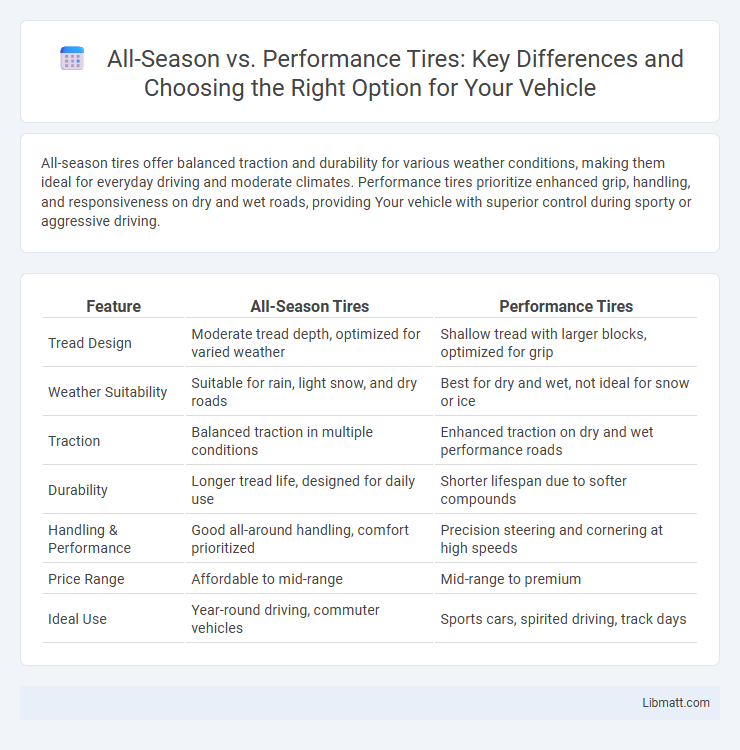All-season tires offer balanced traction and durability for various weather conditions, making them ideal for everyday driving and moderate climates. Performance tires prioritize enhanced grip, handling, and responsiveness on dry and wet roads, providing Your vehicle with superior control during sporty or aggressive driving.
Table of Comparison
| Feature | All-Season Tires | Performance Tires |
|---|---|---|
| Tread Design | Moderate tread depth, optimized for varied weather | Shallow tread with larger blocks, optimized for grip |
| Weather Suitability | Suitable for rain, light snow, and dry roads | Best for dry and wet, not ideal for snow or ice |
| Traction | Balanced traction in multiple conditions | Enhanced traction on dry and wet performance roads |
| Durability | Longer tread life, designed for daily use | Shorter lifespan due to softer compounds |
| Handling & Performance | Good all-around handling, comfort prioritized | Precision steering and cornering at high speeds |
| Price Range | Affordable to mid-range | Mid-range to premium |
| Ideal Use | Year-round driving, commuter vehicles | Sports cars, spirited driving, track days |
Introduction to All-Season and Performance Tires
All-season tires provide a balanced blend of traction, handling, and durability for year-round driving in various weather conditions, including light snow and rain. Performance tires are engineered for enhanced grip, cornering, and responsiveness on dry and wet roads, ideal for sporty driving and high-speed stability. Choosing the right tire depends on your driving style, climate, and vehicle performance needs.
Key Differences Between All-Season and Performance Tires
All-season tires offer versatile traction suited for wet, dry, and light winter conditions, prioritizing longevity and comfort with rubber compounds designed to remain flexible across a wide temperature range. Performance tires emphasize maximum grip and handling precision in dry and wet conditions, using softer rubber compounds and specialized tread patterns that enhance cornering and braking but wear out faster. Key differences include the all-season tire's balanced durability and moderate traction versus the performance tire's focus on superior responsiveness and shorter tread life.
Tread Design and Rubber Compound Comparison
All-season tires feature a moderate tread design with multiple sipes and grooves to provide balanced traction in wet, dry, and light snow conditions, while performance tires boast a more aggressive, asymmetrical tread pattern with larger tread blocks optimized for maximum grip and handling on dry roads. The rubber compound in all-season tires is formulated to maintain flexibility across a wide temperature range, enhancing durability and comfort, whereas performance tires use softer compounds that improve grip and responsiveness but wear out faster under extreme driving conditions. These differences in tread design and rubber compound reflect the distinct priorities of long-lasting versatility in all-season tires versus superior traction and precision in performance tires.
Weather Suitability and Seasonal Performance
All-season tires offer balanced performance across various weather conditions, providing reliable traction in dry, wet, and light snow situations, making them ideal for moderate climates with year-round use. Performance tires prioritize grip and responsiveness in warm, dry conditions, delivering superior handling and cornering but often losing effectiveness in cold or snowy weather. Your choice depends on whether you need versatile, all-weather capability or enhanced performance during specific seasons.
Traction and Handling: What to Expect
All-season tires provide reliable traction and balanced handling in diverse weather conditions, including light rain and mild snow, making them suitable for everyday driving. Performance tires offer superior grip and precision handling on dry and wet roads, enhancing cornering and braking responsiveness for sportier driving experiences. Your choice between these tires depends on whether you prioritize all-weather versatility or maximum traction and handling performance.
Longevity and Durability: Which Lasts Longer?
All-season tires generally offer greater longevity and durability, typically lasting between 50,000 to 70,000 miles due to their harder rubber compounds designed for a variety of road conditions. Performance tires prioritize grip and handling with softer rubber compounds, resulting in a shorter lifespan averaging 20,000 to 40,000 miles. Choosing all-season tires can extend tire life, making them a cost-effective option for everyday driving.
Comfort and Noise Levels on the Road
All-season tires generally provide a quieter and smoother ride due to their balanced tread design and softer rubber compounds, which absorb road imperfections effectively, enhancing overall comfort during daily driving. Performance tires feature stiffer sidewalls and more aggressive tread patterns that improve handling and grip at high speeds but often result in increased road noise and a firmer ride, potentially reducing comfort on longer journeys. Choosing all-season tires benefits drivers seeking noise reduction and comfort, while performance tires cater to those prioritizing sportier handling despite higher cabin noise.
Cost Considerations: Upfront and Long-Term
All-season tires generally have a lower upfront cost and offer longer tread life, making them a more economical choice for everyday driving and reducing long-term expenses. Performance tires tend to be more expensive initially due to advanced tread compounds and design, but they provide superior handling and grip, which can offset costs by improving safety and driving experience. Your decision should balance budget constraints with performance needs to optimize tire investment over time.
Ideal Buyers: Who Should Choose Which Tire?
All-season tires are ideal for drivers seeking reliable performance in varied weather conditions, including light snow and rain, making them suitable for daily commuters in moderate climates. Performance tires cater to enthusiasts who prioritize superior handling, traction, and speed on dry or wet roads, perfect for sporty driving or aggressive cornering. Your choice depends on whether you value year-round versatility or enhanced driving dynamics.
Final Verdict: Choosing the Right Tire for Your Needs
All-season tires offer balanced performance in a variety of weather conditions, making them ideal for drivers seeking versatility and longevity. Performance tires prioritize superior handling and traction on dry and wet roads, best suited for enthusiasts and those driving in mild climates. The final choice depends on your driving style and local weather: opt for all-season tires for year-round reliability or performance tires for enhanced grip and responsiveness.
All-season vs Performance tires Infographic

 libmatt.com
libmatt.com